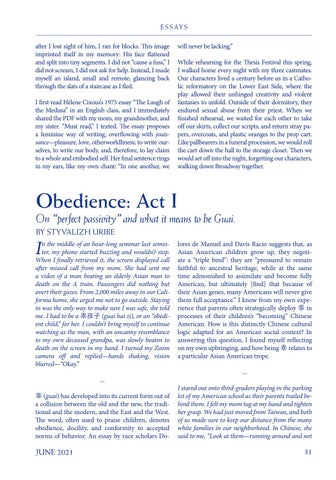E S S AY S after I lost sight of him, I ran for blocks. This image imprinted itself in my memory: His face flattened and split into tiny segments. I did not “cause a fuss,” I did not scream, I did not ask for help. Instead, I made myself an island, small and remote, glancing back through the slats of a staircase as I fled. I first read Hélene Cixous’s 1975 essay “The Laugh of the Medusa” in an English class, and I immediately shared the PDF with my mom, my grandmother, and my sister. “Must read,” I texted. The essay proposes a feminine way of writing, overflowing with jouissance—pleasure, love, otherworldliness; to write ourselves, to write our body, and, therefore, to lay claim to a whole and embodied self. Her final sentence rings in my ears, like my own chant: “In one another, we
will never be lacking.” While rehearsing for the Thesis Festival this spring, I walked home every night with my three castmates. Our characters lived a century before us in a Catholic reformatory on the Lower East Side, where the play allowed their unhinged creativity and violent fantasies to unfold. Outside of their dormitory, they endured sexual abuse from their priest. When we finished rehearsal, we waited for each other to take off our skirts, collect our scripts, and return stray papers, overcoats, and plastic oranges to the prop cart. Like pallbearers in a funeral procession, we would roll the cart down the hall to the storage closet. Then we would set off into the night, forgetting our characters, walking down Broadway together.
Obedience: Act I
On “perfect passivity” and what it means to be Guai. BY STYVALIZH URIBE
I
n the middle of an hour-long seminar last semester, my phone started buzzing and wouldn’t stop. When I finally retrieved it, the screen displayed call after missed call from my mom. She had sent me a video of a man beating an elderly Asian man to death on the A train. Passengers did nothing but avert their gazes. From 2,000 miles away in our California home, she urged me not to go outside. Staying in was the only way to make sure I was safe, she told me. I had to be a 乖孩子 (guai hai zi), or an “obedient child,” for her. I couldn’t bring myself to continue watching as the man, with an uncanny resemblance to my own deceased grandpa, was slowly beaten to death on the screen in my hand. I turned my Zoom camera off and replied—hands shaking, vision blurred—“Okay.” ... 乖 (guai) has developed into its current form out of a collision between the old and the new, the traditional and the modern, and the East and the West. The word, often used to praise children, denotes obedience, docility, and conformity to accepted norms of behavior. An essay by race scholars Do-
JUNE 2021
lores de Manuel and Davis Racio suggests that, as Asian American children grow up, they negotiate a “triple bind”: they are “pressured to remain faithful to ancestral heritage, while at the same time admonished to assimilate and become fully American, but ultimately [find] that because of their Asian genes, many Americans will never give them full acceptance.” I know from my own experience that parents often strategically deploy 乖 in processes of their children’s “becoming” Chinese American. How is this distinctly Chinese cultural logic adapted for an American social context? In answering this question, I found myself reflecting on my own upbringing, and how being 乖 relates to a particular Asian American trope. ... I stared out onto third-graders playing in the parking lot of my American school as their parents trailed behind them. I felt my mom tug at my hand and tighten her grasp. We had just moved from Taiwan, and both of us made sure to keep our distance from the many white families in our neighborhood. In Chinese, she said to me, “Look at them—running around and not
31









